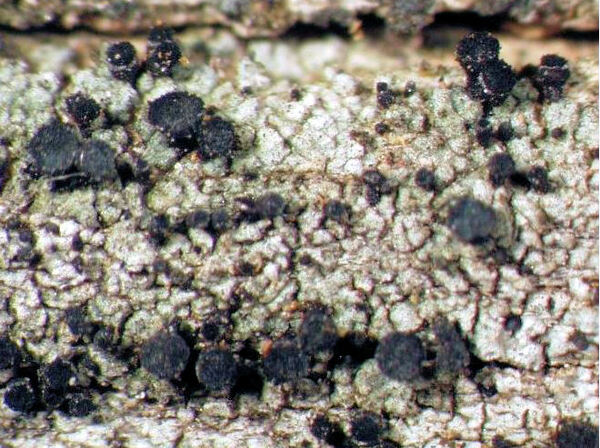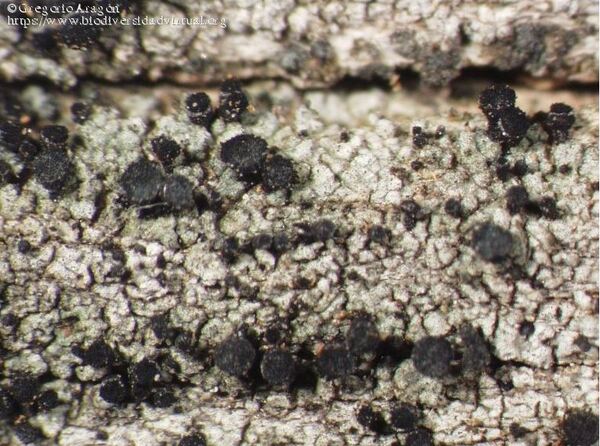Calicium montanum Tibell
Mycotaxon, 70: 432, 1999.
Synonyms:
Distribution: C - Tosc (Tibell 1999, Puntillo & Puntillo 2009).
Description: Thallus crustose, episubstratic, granular to verrucose, pale grey to grey-green. Apothecia stalked, pin-like, 0.3-0.4 mm high, black, white-pruinose on the outer surface of the capitulum. Stalk black, epruinose, 0.11-0.2 mm thick, of dark brown, irregularly interwoven and strongly sclerotized hyphae, the outermost layer gelatinous, hyaline; capitulum obovoid to lenticular, 0.2-0.3 mm across, with a dark brown to aeruginose-green exciple of almost isodiametric, sclerotized cells; hypothecium dark brown, flat to slightly convex. Asci cylindrical-clavate, formed singly, dissolving early, with uniseriately arranged spores. Ascospores 1-septate, brown, ellipsoid, 9-11.5 x 5-6 µm, with coarse, irregular cracks. Photobiont chlorococcoid. Spot tests: thallus K-, C-, KC-, P-. Chemistry: divaricatic and 2-O-methyldivaricatic acids.Note: a recently-described, rare but widespread species found on lignum, especially on decorticated stumps of Castanea, but also on conifers. Reported from Tuscany and perhaps more widespread in Italy. It is included in the Italian red list of epiphytic lichens as “Critically Endangered” (Nascimbene & al. 2013c).
Growth form: Crustose
Substrata: lignum
Photobiont: green algae other than Trentepohlia
Reproductive strategy: mainly sexual
In underhangs rarely wetted by rain
Commonnes-rarity: (info)
Alpine belt: absent
Subalpine belt: absent
Oromediterranean belt: absent
Montane belt: very rare
Submediterranean belt: absent
Padanian area: absent
Humid submediterranean belt: very rare
Humid mediterranean belt: absent
Dry mediterranean belt: absent

Predictive model
Growth form: Crustose
Substrata: lignum
Photobiont: green algae other than Trentepohlia
Reproductive strategy: mainly sexual
In underhangs rarely wetted by rain
Commonnes-rarity: (info)
Alpine belt: absent
Subalpine belt: absent
Oromediterranean belt: absent
Montane belt: very rare
Submediterranean belt: absent
Padanian area: absent
Humid submediterranean belt: very rare
Humid mediterranean belt: absent
Dry mediterranean belt: absent

Predictive model
 Index Fungorum
Index Fungorum
 GBIF
GBIF



